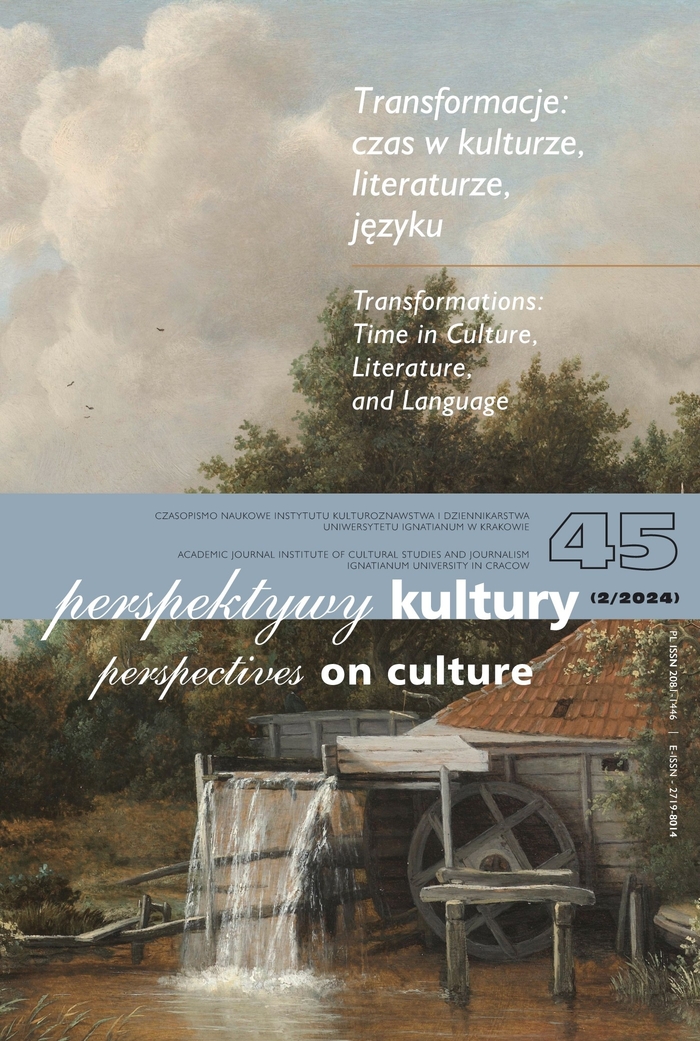Transformacje gatunkowe w dramatach Szekspira
Abstrakt
Problem transformacji gatunkowych w dramatach Szekspira jest omawiany na podstawie tradycji teoretycznych od Arystotelesa, poprzez pisma Plauta, Cinthia, Castelvetra, Guariniego i Sidneya. Główny problem skupiony jest na mieszaniu wątków komediowych i tragicznych prowadzących do mody na tragikomedię. Szekspirowskie komedie, tragedie, sztuki historyczne i tragedie rzymskie są pokrótce omówione dla zilustrowania szekspirowskich transformacji, które dowodzą, że tradycyjny, wyraźny podział na tragedie, komedie i tragikomedie był zbyt wąski i zbyt ograniczający rozumienie kondycji człowieka w okresie wczesnonowożytnym.
Bibliografia
Aristotle. Poetics.Translated by S. H. Butcher.
www.classics.mit.edu//Aristotle/poetics (access 12.07.2022)
Castelvetro, Lodovico. (1570) Poetica d'Aristotele vulgarizzata e sposta.
Castelvetro on the Art of Poetry, ed. & trans. Andrew Bongiorno (1984). Binghamton, NY.
Cinthio, Giraldi. Discourse or Letter on the Composition of Comedies and Tragedies (1543). transl. Daniel Javitch ( 2011).
https://www.journals.uchicago.edu/doi/pdf/10.1086/rd.39.41917488 (access 12.05.2022)
Gibinska, Marta. “The beauty of the World and the Quintessence of Dust: Shakespeare’s Deconstruction of the Renaissance Ideal of Man”. B.A.S (British and American Studies) vol. XXVI. 2020, pp. 129-142
Guarini, Giovanni Batista.(1590). Il Pastor Fido.
Il pastor fido: or The faithfull shepheard. Translated out of Italian into English. London: Printed [by Thomas Creede] for Simon VVaterson, 1602.
https://quod.lib.umich.edu/e/eebo/A02284.0001.001?view=toc (access 24 03.2022)
Hall, Edward. The Union of the Two Noble and Illustrate Famelies of Lancastre and Yorke (1548). https://internetshakespeare.uvic.ca/doc/Hall_H5_M/section/index.html (access 12.05.2022)
Holinshed, Raphael. (1577 and 1587). Chronicles of England, Scotland, and Ireland.
The Oxford Handbook of Holinshed's Chronicles. Oxford: Oxford University Press. (2013)
Mukherji, Subha. (2015). “The action of my life’: tragicomedy tragedy, and Shakespeare’s mimetic experiments”. Michaell Neill and David Schalkwyk (eds.). The Oxford Handbook to Shakespearean Tragedy. Oxford: Oxford University Press, pp. 267-284
www.academia.edu/13551078/_The_action_of_my_life_tragicomedy_tragedy_and_Shakespeare_s_mimetic_experiments (access 10.05.2022)
Plautus, Titus Maccius. Amphitrion. www. Gutenberg.org (access 12.04.2022)
Pollard, Tanya. (2015). Tragicomedy. Chapter 18, The Oxford History of Classical Reception in English Literature, Vol. 2: 1558-1660. Patrick Cheney and Philip Hardie (eds.). Oxford: Oxford University Press, pp. 419-432
https://www.academia.edu/19189784/_Tragicomedy_in_Oxford_History_of_Classical_Reception_in_English_Literature_2015. (access 07.05.2022)
Plutarch. Lives (Thomas North's 1579 English translation).
Translation by Bernadotte Perrin (1923). The Loeb Classical Library Cambridge, MA and London).
https://penelope.uchicago.edu/Thayer/e/roman/texts/plutarch/lives/home.html (access 12.01.2023)
Reiss, Timothy J. (1999). ‘Renaissance Theatre and the Theory of Tragedy’, in Cambridge History of Literary Criticism: Vol. 3: The Renaissance, ed. Glyn Norton. Cambridge pp. 229-247.
Sidney,Philip (1595). A Defence of Poesie and Poems.London. Paris & Melbourne: Cassell & Company 1891 https://www.gutenberg.org/files/1962/1962-h/1962-h.htm (access 14.03.2023)
Smith, Bruce (1988). Ancient Scripts and Modern Experience on the English Stage, 1500-1700. Princeton: Princeton University Press
Snyder, Susan. (2001) „The Genres of Shakespeare’s Plays”. The Cambridge Companion to Shakespeare, eds. Margreta de Grazia and Stanley Wells, pp. 83-98
Tasso, Torquato. Aminta (1537). Translated into English verse by John Dancer. Together with divers ingenious poems. (1660). London: Printed for John Starkey, at the Miter, near the Middle Temple-gate in Fleet-street, .
https://quod.lib.umich.edu/e/eebo2/A94684.0001.001?view=toc (access 10.04.2022)
Copyright (c) 2024 Perspektywy Kultury

Utwór dostępny jest na licencji Creative Commons Uznanie autorstwa – Bez utworów zależnych 4.0 Międzynarodowe.
Autor, zgłaszając swój artykuł, wyraża zgodę na korzystanie przez Wydawnictwo Uniwersystet Ignatianum z utworu na następujących polach eksploatacji:
- utrwalania utworu w formie papierowej, a także na nośniku cyfrowym lub magnetycznym;
- zwielokrotnienia utworu dowolną techniką, bez ograniczenia ilości wydań i liczby egzemplarzy;
- rozpowszechniania utworu i jego zwielokrotnionych egzemplarzy na jakimkolwiek nośniku, w tym wprowadzenia do obrotu, sprzedaży, użyczenia, najmu;
- wprowadzenia utworu do pamięci komputera;
- rozpowszechniania utworu w sieciach informatycznych, w tym w sieci Internet;
- publicznego wykonania, wystawienia, wyświetlenia, odtworzenia oraz nadawania i reemitowania, a także publicznego udostępniania utworu w taki sposób, aby każdy mógł mieć do niego dostęp w miejscu i czasie przez siebie wybranym.
Wydawca zobowiązuje się szanować osobiste prawa autorskie do utworu.





